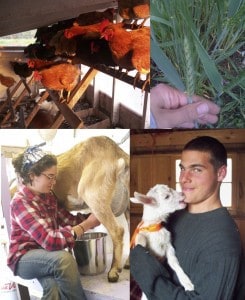Originally posted on The Jew and the Carrot
By Seth Fineman (Adamah Fellow, Spring 2012) & Sarah Chandler (Adamah Associate Director)
In ancient times, the challah eaten on Shavuot was the first taste of the new year’s wheat. During the counting of the Omer, first barley, and then wheat, were counted in anticipation of the Shavuot festival. When the other first fruits were offered in Jerusalem, two large challot were made of the first fruits of the wheat plant. Like the first wheat plants, the Challot were also big, fluffy, and delicious!
 In modern times, we are blessed with year-round access to milled grains ready to bake into delicious breads and cakes. In our climate, the wheat is still completely green – we expect these grains to be ready for harvest sometime in July. Yet, as we look toward Shavuot, we are aware that this festival celebrates more than just the giving of the Torah – it also reminds us of the seasons in ancient Israel. Shavuot only comes once a year, but Shabbat comes every week!
In modern times, we are blessed with year-round access to milled grains ready to bake into delicious breads and cakes. In our climate, the wheat is still completely green – we expect these grains to be ready for harvest sometime in July. Yet, as we look toward Shavuot, we are aware that this festival celebrates more than just the giving of the Torah – it also reminds us of the seasons in ancient Israel. Shavuot only comes once a year, but Shabbat comes every week!
While the wheat that goes into our challah may come in a package for most of the year , Consider: the richness of the eggs, an essential ingredient in challah, come from our very own chickens at Adamah farm. (Read on below about a recent Friday afternoon challah marathon, coupled with farm chores and pre-shabbat rituals here at Adamah farm.)
One of the most special parts of preparing for Shabbat is making your own challah! Sweeter and fluffier than store bought challah, making challah at home allows you to add your favorite ingredients to it. Best of all, when it’s time for dinner, it is warm and fresh.
While some people may already have a challah baking routine incorporated into their pre-Shabbat plans, for others it can be a bit stressful. Here is a preview of what day to day Adamah is like, and how we recently figured out how to incorporate challah making successfully into our plans. The closer you make it to Shabbat, the fresher it will taste!
- 3 hours before Shabbat: Gather eggs from the chickens.
- 2.5 hours before Shabbat: Mix ingredients, knead, let rise.
- 2 hours before Shabbat: Go milk goats.
- 1.5 hours before Shabbat: Braid dough, cover in egg wash, let rise.
- 1 hour and 15 minutes before Shabbat: Mikvah (Ritual purification process done at many times, including before Shabbat. At Adamah we jump in the river!), shower and dress for Shabbat.
- 45 minutes before Shabbat: Put dough in oven at least 45 min before Shabbat starts; put oven on timer to turn off at candle lighting.
- 15 minutes before Shabbat: Put chickens to bed.
- At candlelighting time: Remove challot from oven. Light Shabbat Candles.
After we made motzi, the challah was devoured, and everybody loved it. That feeling of success of making others happy mad us feel warm on the inside, and so did the challah.
ADAMAH connects people to their roots and to the land, to community, to Judaism and to themselves. Adamah means “earth.” Adamah’s educational programs and homegrown products emphasize hands-on experience and peer leadership to empower participants with skills and confidence to make a difference. Now accepting applications for our 2012 Summer and Fall Fellowships! Visit adamah.org today.




When do you daven in your schedule? Won’t the challas cool off by then?
Where is ur farm located? City, State.
Can you share your challah recipe?
(Mine takes lot longer to rise, so I hardly ever make it.)
Thanks!
We start our dough at 9am Friday, let it rise all day, punching down as needed. 3 hours before Shabbat, we shape and paint with egg wash, let it rise another half hour. Then into the oven, and it’s sitting on the table cooling on a rack by at least an hour before Shabbat. The rest of dinner stays warm in the oven once the challah is out. So the challah isn’t still warm when we sit down to make motzi (there’s that hour, then candlelighting, davening, and finally the table service), but it is amazing and beloved and however much we put on the table is devoured immediately!
It’s an important part of my spouse’s pre-Shabbat ritual, and he has become renowned in our community because of that challah.
Our eggs come from Glaum Farm in Aptos, not our own backyard…